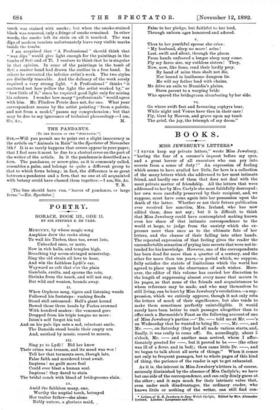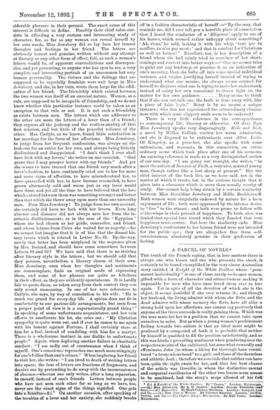BOOKS.
MISS JEWSBURY'S LETTERS.*
"I NEVER keep my private letters," wrote Miss Jewsbury, "having the fear of a coroner's inquest before my eyes. and a great horror of all executors who can pry into secrets from a sense of duty !" An expression of feeling which seems to have availed her little, for here is a collection of the many letters which she addressed to her most intimate friend, and hardly one of them that does not deal with the most private matter of friendship. All the letters that were addressed to her by Mrs. Carlyle she most faithfully destroyed :. her own were carefully preserved by their recipient, and, we suppose, must have come again into her possession upon the death of the latter. Whether or not their future publication ever received her sanction, Mrs. Ireland, who has now edited them, does not Bay; but it is difficult to think that Miss Jewsbury could have contemplated making known. even her share of that intimate correspondence to the world at large, to judge from the anxiety which she ex- presses more than once as to the ultimate fate of her letters, and the chance of their falling into other hands. The repeated expression of that feeling gives the reader the uncomfortable sensation of prying into secrets that were not in- tended for his knowledge. However, one of the correspondents. has been dead for more than a quarter of a century, and the other for more than ten years,—a period which, we suppose,. fully satisfies the statute of limitations which he world has agreed to place upon the observance of such wishes. More- over, the editor of this volume has carried her discretion to the length of suppressing almost every name that occurs in its pages, so that none of the friends and acquaintances to whom reference may be made, and who may themselves be still living, can be hurt by Miss Jewsbury's revelations,—a sup- pression, which we entirely approve, though it not only robs the letters of much of their significance, but also tends to make them sometimes perfectly unintelligible, it would surely have been better to omit passages altogether than to offersuch a Barmecide's Feast as the following account of one of Miss Jewsbury's parties :—" Dr. — told me at Mr. —'s. on Wednesday that he wanted to bring Mr. —, Mr. —, and Mr. —, on Saturday (they had all made various starts, and, finally, it was really to come off). So, accordingly, about 5 o'clock, Mr. — and another man. arrived, whom I affec- tionately greeted for —, but it proved to be — (the other was ill of a fever, and in bed) ; then came little Dr. —, and we began to talk about all sorts of things." When it comes- not only to frequent passages, but to whole pages of this kind of thing, the patience of the reader is apt to get exhausted.
As it is, the interest in Miss Jewsbury's letters is, of course,. seriously diminished by the absence of Mrs. Carlyle's ; we have but one side of the correspondence, and can only dimly guess at. the other ; and it says much for their intrinsic value that,. even under such disadvantages, the ordinary reader, who knows little or nothing of the writer, can still find con- •
* Letters of G. B. jewsbuni to Jane Welsh Carlyle. Edited by Mrs. Alexander
Ireland. London, MUMMA/ and 0o. - siderable pleasure in their perusal. The exact cause of this interest is difficult to define. Possibly their chief value con- sists in affording a very curious and interesting study of character, for, as far as any woman can reveal herself by her own words, Miss Jewsbury did so lay bare her inmost thoughts and feelings to her friend. The letters are obviously honest and genuine, written without any attempt at literary or any other form of effect, full, as such a woman's letters would be, of apparent contradictions and discrepan- cies, and yet presenting, to anyone who has eyes to see, a very complete and interesting portrait of an uncommon but very human personality. The virtues and the failings that are supposed to be especially feminine were writ large in Miss Jewsbury, and she, in her turn, wrote them large for the edifi- cation of her friend. The friendship which existed between the two women was itself of an unusual nature. Women, as a rule, are supposed to be incapable of friendship, and we do not know whether this particular instance could be taken as an exception to that rule or not. It is not such a friendship as exists between men. The letters which one addresses to the other are more the letters of a lover than of a friend ; they express all the jealousy and the restless anxiety of that first relation, and but little of the peaceful reliance of the other. Mrs. Carlyle, as we know, found little satisfaction in her marriage for the force of her affections. Miss Jewsbury, to judge from her frequent confessions, was always on the look-out for an outlet for her own, and always being bitterly disillusioned and disappointed. "I don't think I ever shall have luck with my lovers," she writes on one occasion. "God grant that I may prosper better with my friends." And yet she seems to have treated that one friend very much after a lover's fashion, to have continually cried out to her for more and more signs of affection, to have misunderstood her, to have quarrelled with her, to have become reconciled, to have grown alternately cold and warm just as any lover would - have done, and yet all the time to have believed that the love which existed between them was something stronger and better than that which she threw away upon more than one unworthy man. Poor Miss Jewsbury ! To judge from her own account, she certainly did have no luck with her lovers. Even long absence and distance did not always save her from the in- evitable disillusionment; as in the case of the "Egyptian" whom she had chosen as her guide, counseller, and friend, and whose letters from Cairo she waited for so eagerly,—for we cannot but imagine that it is of him that the dismal his- tory treats which is related in Letter No. 61. By-the-way, surely that letter has been misplaced in the sequence given by Mrs. Ireland, and should have come somewhere between Letters 88 and 92? We have said that there is no striving after literary style in the letters ; but we should add that they possess, nevertheless, a literary charm of their own. Miss Jewsbnry, even when her thoughts and sentiments are commonplace, finds an original mode of expressing them, and some of her phrases are quite as felicitous in their effect, as they are evidently spontaneous. It is hardly fair to quote them, as taken away from their context they can only sound unmeaning. In one of her rare references to Carlyle, she says, by way of consolation to his wife : "He is much too grand for every-day life. A sphinx does not fit in comfortably to our parlour-life arrangements, but seen from a proper point of view it is a supernaturally grand thing !" in speaking of some unfortunate acquaintance, and her vain efforts to ameliorate his lot, she cries out : "My Christian sympathy is quite worn out, and if ever he comes to me again with his lament against Fortune, I shall certainly stare at him for a fool, instead of condoling with him for a martyr. there is a wholesome instinct in our dislike to unfortunate people." Again, when deploring another failure in charitable conduct : "I am sadly out of countenance when I think of Myself; One's conscience reproaches one much more stingingly 'for one's follies than one's crimes." When imploring her friend to visit her, she writes : "I am tired to death of writing letters into space; the best of letters are fractions of fragments, and deceive one by pretending to do away with the inconveniences of absence—whereas one only writes, after a long separation, Its dteself, instead of one's friends. Letters between people itto. have not seen each other for so long as we have, too, never are the -exact, signs of the things signified. One gets off in a fashion characteristic of herself :—" By-the-way, that reminds me, did I ever tell you a horrible piece of consolation that I heard the conductor of a ' diligence ' apply to one of his horses, which seemed rather unhappy about something P Ah, viens,' he said, lashing it with his whip, taut que tu souffres, tn n'es pas mort ; ' and that is comfort for Christians as well as horses !" Excellent, too, is her description of a friend whom she had vainly tried to convince of her short- comings and convert into better ways :—" One no sooner tries to point out any tendency, or practise it as an indication of one's meaning, than she bolts off into some special individual instance, and begins justifying herself instead of trying to understand what one means ; she always seems counsel for herself to disprove what one is trying to make her understand, instead of usitig her own conscience to throw light on the matter for her own guidance Betsy seems to think that if she can out-talk one, the fault is done away with, like a piece of false logic." Betsy is by no means a unique instance ; who has not experienced the extraordinary elusive- ness with which some slippery souls seem to be endowed ? There is very little reference in the correspondence to contemporary life, literary or otherwise. Of Jane Eyre Miss Jewsbury speaks very disparagingly. Hide and Seek, a novel by Wilkie Collins, excites her warm admiration, and she is disposed to be enthusiastic over Alton, Locke. Of Kingsley, as a preacher, she also speaks with some enthusiasm, and recounts, in this connection, an extra- ordinary scene which took place after one of his sermons. An amusing reference is made to a very distinguished author of our own day. "I am going out to-night, she writes, "to meet the author of Nemesis of Faith, a very nice, natural young man, though rather like a lost sheep at present." But the chief interest of the book lies, as we have said, not in the matter of which it treats, but in the curious insight that it gives into a character which is more than usually worthy of study. One cannot help being struck by a certain similarity between Miss Geraldine Jewsbury and Mdlle. Babhkirtseff. Both women were singularly endowed by nature for a keen enjoyment of life ; both were oppressed by the intense desire to " live " to the utmost ; and both were prone to follow will- o'-the-wisps in their pursuit of happiness. To both, also, was denied that special love round which they fancied that true happiness must centre. But here the similarity ends. Miss Jewsbury's confessions to her bosom friend were not intended for the public eye ; they are altogether free from self- consciousness, absolutely genuine in their profession of feeling.







































 Previous page
Previous page